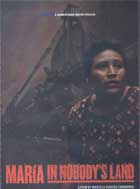
Maria in Nobody’s Land 2010
Distributed by Women Make Movies, 115 W. 29th Street, Suite 1200,New York, NY, 10001; 212-925-0606
Produced by Marcela Zamora Chamorro, Edu-Ponces, Oscar Martinez
Directed by Marcela Zamora Chamorro
DVD, color, 86 min.
Sr. High - General Adult
Human Rights, Central America, Immigration
Date Entered: 07/25/2014
Reviewed by Sandra Collins, Byzantine Catholic Seminary Library, Pittsburgh, PAThis documentary presents a first-hand account of the harrowing journey that staggeringly poor Central Americans migrants must undertake to even get close to the American border, a mythical place of plenty and opportunity. Showcasing the vulnerability of three Salvadoran women, this film strives to demonstrate the real cost of illegal immigration—not in dollars and cents but in human terms.
Long before arriving at the U.S. border, many migrants suffer robbery, beatings, rape, kidnapping and even death at the hands of those who prey upon the want and needs of those seeking a better way. In this, says one activist, “migration also means victims.” Often, families are left with little or no information about their family members who are lost along the way; their struggle to find closure is equally as poignant as the travellers themselves. The film pointedly illustrates how countries like Mexico basically deliver human beings into the hands of criminals since it is either unable or unwilling to safeguard anyone’s personal protection, including and especially migrants. Juxtaposed against these images of political indifference are also the stories of simple, caring individuals—the kindness of strangers along the treacherous passage. These include women who on a daily basis prepare food and water packages to be thrown to stowaway migrants on local trains and various individuals offering sanctuary along the way. In many ways, there are echoes within this film of the underground railroad of 19th century America, where the cost of freedom far outweighed the considerable risks, not least of which was leaving kith and kin. Ultimately, the film indirectly asks prescient questions about justice and mercy—that is, how can any nation claim a civilized status if they do not provide for the poorest and most vulnerable in their midst? What dignity can we offer when migrants are mere statistics? This is a timely film, especially in light of the current crisis with immigrant children travelling alone to the U.S. border.